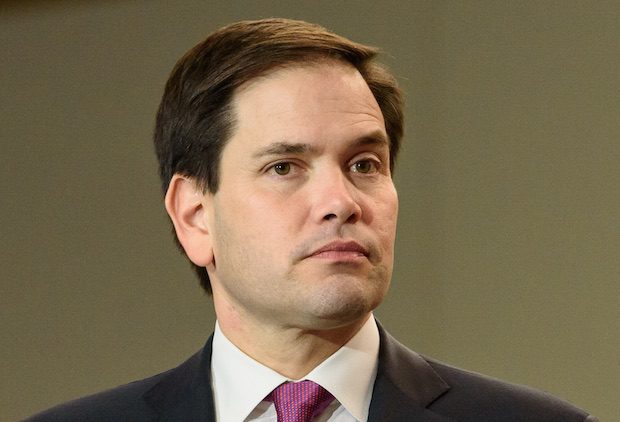Rubio Is a Funny Candidate For the “Establishment”

Is there really an establishment, anti-Trump “lane” of any consequence in the GOP race? I’ve been asking that question for some time, for one simple reason: since Trump’s rise, there have been no strong, center-right establishment candidates in the race.
Trump, Cruz and Carson (and Rand Paul) have been generally understood as anti-establishment candidates whom the political class would be unhappy with. The candidates typically classed as “establishment” or “mainstream” from the beginning were: Bush, Christie, Kasich, Walker, Perry—and Rubio.
But Rubio is a peculiar candidate to be calling “establishment” or “mainstream” for two reasons. First, because his positioning in his Senate election and in terms of his stances on a host of issues is quite right-wing—more right-wing than Trump’s on most issues apart from immigration. And second, because he ran for the Senate, and now for the White House, as an upstart candidate defying a party leadership that wanted him to wait his turn.
You can tell the weirdness of Rubio’s positioning as an establishment favorite by looking at who supporters of different candidates choose for their second choices. The data in a recent NBC tracking poll is highly instructive in that regard.
When you look at Rubio’s own supporters, and ask them who their second choice is, the #1 pick—with 31%—is Ted Cruz. The #2 pick—with 17%—is Donald Trump. 9% go to Ben Carson. So, a substantial majority of Rubio’s own supporters prefer an anti-establishment candidate to any of the other “establishment” choices.
And when you look at the “establishment” candidate’s second choices, while there is a clear preference for Rubio, it’s far from overwhelming. Bush supporters, when asked who they’d pick second, picked “Don’t Know” first, with 23%, then Rubio, with 19%, then Kasich, with 16%. Trump, Cruz and Carson together garnered 32%. So it’s far from clear that Bush dropping out will bring his voters overwhelmingly to Rubio’s side (though Rubio will likely pick up the bulk of his campaign infrastructure).
Kasich supporters, when asked who they’d pick second, gave 24% to Rubio – but gave 21% to Bush and 16% to Donald Trump. Again, hardly an overwhelming preference for Rubio. A similar pattern obtains when you look at Christie and Fiorina supporters. As each establishment candidate drops out, Rubio would expect to garner 20-30% of that candidate’s vote. The remainder goes elsewhere, smeared out among the other remaining candidates, with Trump garnering half to two-thirds as much as Rubio.
Meanwhile, guess which candidate’s voters give the largest share of second-choice votes to Rubio?
That’s right: Ted Cruz. 33% of Cruz voters would opt for Rubio as a second choice, followed by Trump, who gets 26% of Cruz voters, and Carson, who gets 17%.
What we’ve learned from the three contests so far is that, if the electorate in a given state is more conservative (like Iowa and South Carolina), Rubio does well winning late-breaking deciders. If it isn’t (as in New Hampshire), then he doesn’t.
Super Tuesday’s states are mostly on the conservative end of the spectrum – and hence should give Rubio a chance to break through and actually win states like Virginia (where he polled second to Trump earlier in February), Minnesota (where he was leading in a January poll) or Colorado (which hasn’t been polled recently, but where Rubio was strong in a November poll). But by the same token, there are strong opportunities for Cruz to win, particularly in his home state of Texas but also in nearby Oklahoma and Arkansas. And Trump, of course, is strong across-the-board, not only across the southern states but in states like Massachusetts.
But the real point is, when we move to the northeast and the more easterly parts of the midwest, it’s less clear that the territory is so favorable to Rubio. In two Michigan polls from mid-February, Rubio polled 10% and 12% respectively—in-line with Kasich’s polling, and far behind Trump. Illinois and Ohio haven’t been polled recently, but if Kasich can hold out until Ohio he should do very well there, and Illinois is similarly favorable territory for Kasich.
As well as for Trump. Because that’s the thing: Trump is not only a candidate running against the establishment; he’s also the relative centrist in a three-way race with two distinctly right-wing candidates. Rubio is far more palatable to moderate and “somewhat” conservative voters than Cruz is in such a race. But it’s not obvious to me that he’s far more palatable than Trump.
Don’t get me wrong: it’s clear that the GOP establishment is about to line up fully behind Rubio, certainly if reports like these are to be believed. It’s just worth remembering that this is itself a bit of a strange result, and, therefore, it shouldn’t be too surprising if even more centrist, establishment-oriented Republican voters don’t fully fall into line.